ATSC 3.0 Modulator for Lab
ATSC 3.0 LabMod
The first STL Gateway compliant ATSC 3.0 modulator for Lab! Compact, portable and easy-to-use, LabMod generates live ATSC 3.0 RF signals or IQ pattern files supporting the whole ATSC 3.0 standard with LDM support.
"*" indicates required fields
Applications
- ATSC 3.0 RF generate & playback
- ATSC 3.0 reception validation (optional)
- R&D or factory tests and measurements
- Chipset development
- TV / Set Top Box development
- Demonstrations and roadshows
Benefits
- 1st ATSC 3.0 modulator
- Compact (600g), USB self-powered
- 3-in-1 product: RF Record (optional) + Playback + Generate
- ATSC 3.0 PlugFest proven
- Intuitive & easy to use GUI
- Easy to configure: real-time Frame configuration validation engine
ATSC 3.0 LabMod is the STL Gateway compliant modulator for laboratories. Compact, portable and easy-to-use, LabMod covers the whole ATSC 3.0 standard with LDM support. In addition, LabMod performs channel simulation, noise generation, RF spectrum analysis and RF recording/playing.
ATSC 3.0 LabMod is the perfect modulator for discovering ATSC 3.0 standard: generate live ATSC 3.0 RF signals or IQ pattern files, record live ATSC 3.0 transmission in different places over the world (optional) and playback them to test your receiver.
ATSC 3.0 LabMod comes bundled with LabMod Platform and ATSC 3.0 LabMod application for MS Windows.
LabMod is compact, robust, lightweight (600g) and cost-effective: your technicians and engineers can bring it everywhere in their hand bag. LabMod is used along with a PC, running ATSC 3.0 LabMod software, through USB3 connectivity.

Generate live ATSC 3.0 RF signals or IQ pattern files
Input: PRBS, IP STL, TS File
LDM (Layered Division Multiplex) support
TI (Time Interleaving) mode: CTI up to 1448 depth, HTI
Multiple subframes: single/multiple PLP
TxID (Transmitter identification) support
ATSC 3.0 LabMod software application
Easy to use & responsive: real-time configuration validation engine
Frequency range: 70 MHz up to 6 GHz, 1 kHz resolution, configurable attenuation
Real-time overview of the Frame structure
Frame structure detailed characteristics depending on the current configuration
Save/Load configuration file: JSON editable format
Play RF signal on TX output or generate IQ pattern file
TECHNICAL CHARACTERISTICS - Input Interface
- PRBS, IP STL, TS File*
- 2x RF inputs (SMA-type female 50 Ω, F-type female 75 Ω)
- ATSC 3.0 live RF recording
- *Contact us for availability
Clock and synchronisation
- Input
-
10 MHz, 1 PPS, Built-in GPS receiver
- Output
-
10 MHz
- Internal clock
-
10 MHz
GUI
- MS Windows 7/8/8.1/10 (x64) application
- Easy to use, configuration validation engine
- Capability to save/load settings profiles
Output interface
- 2x RF outputs (SMA-type female 50 Ω, F-type female 75 Ω)
- ATSC 3.0 live RF playback and generate
Modulation
- ATSC 3.0 constellation (NUC)
-
QPSK, 16QAM, 64QAM, 256QAM, 1024QAM, 4096QAM
- L1
-
Compatible with all L1 modes
- LDM (Layered Division Multiplex)
-
Yes
- Channel bandwidth
-
6, 7 or 8 MHz
- Guard Interval
-
192, 384, 512, 768, 1024, 1536, 2048, 2432, 3072, 3648, 4096, 4864
- FFT mode
-
8k, 16k, 32k (all Cred_coeff modes)
- Code rate
-
2/15 up to 13/15
- FEC
-
Inner: LDPC 16k and 64k, mode A or B Outer: BCH, CRC or no outer
- Pilot pattern
-
SP3_2, SP3_4, SP4_2, SP4_4, SP6_2, SP6_4, SP8_2, SP8_4, SP12_2, SP12_4, SP16_2, SP16_4, SP24_2, SP24_4, SP32_2, SP32_4
- TI (Time Interleaving) mode
-
CTI up to 1448 depth, HTI
- Subframes
-
Multiple subframes: single/multiple PLP
- TxID*
-
Transmitter identification
- *Contact us for availability
RX MODE - Frequency
- Frequency band
-
70 MHz to 6.0 GHz
- Frequency resolution
-
1 kHz
- Real-time bandwidth
-
1 MHz to 55 MHz
- RBW (Resolution bandwidth)
-
30 Hz (for 2 MHz) to 210 kHz (for 55 MHz)
Noise
- Noise Figure
-
< 8 dB
- Phase Noise at 10 kHz
-
*
- 1200 MHz
-
-91.3 dBc/Hz
- 3200 MHz
-
-85.2 dBc/Hz
- 5000 MHz
-
-82 dBc/Hz
- Noise Floor / Sensitivity
-
-110 dBm
IF Band
- ADC resolution
-
12-bit
- Sampling rate
-
61.44 Msps max
RF Input Characteristics
- Input Dynamic Range
-
-110 to 0 dBm
- Input Level Resolution
-
1 dB
- Max Peak power*
-
0 dBm
- Max DC input*
-
± 15 V
- *Absolute maximum ratings
-
*
Gain Range (1dB step)
- 800 MHz
-
0 to 74 dB
- 2300 MHz
-
0 to 73 dB
- 5500 MHz
-
0 to 65 dB
IIP3
- 1200 MHz
-
7.2 dBm
- 3200 MHz
-
8.4 dBm
- 5000 MHz
-
15.2 dBm
Storage
- 512 GB @ 12 Msps
-
170 min
- 512 GB @ 24 Msps
-
85 min
- 512 GB @ 40 Msps
-
50 min
TX MODE - Frequency
- Frequency band
-
70 MHz to 6.0 GHz
- Frequency resolution
-
1 kHz
- Real-time bandwidth
-
1 MHz to 55 MHz
Phase Noise at 10 kHz
- 1200 MHz
-
-91.3 dBc/Hz
- 3200 MHz
-
-85.2 dBc/Hz
- 5000 MHz
-
-82 dBc/Hz
RF Output Characteristics
- Attenuation range
-
0 to 89 dB
- Amplitude resolution
-
0.01 dB
- Power output
-
5 dBm max
- Max DC output
-
± 15 V
INTERFACES
- RF input
-
1x SMA-type female – 50 Ω 1x F-type female – 75 Ω (up to 2 GHz)
- RF output
-
1x SMA-type female – 50 Ω 1x F-type female – 75 Ω (up to 2 GHz)
- 1PPS/Trigger input
-
1x SMA-type female – 50 Ω
- Trigger output
-
1x SMA-type female – 50 Ω
- 10MHz
-
1x SMA-type female – 50 Ω
- GPS
-
1x SMA-type female – 50 Ω
- Power & Data
-
1x USB3 B-Type
- Auxiliary power
-
1x USB3 B-Type
PHYSICAL
- Dimensions
-
163 x 115 x 32 mm / 6.4 x 4.5 x 1.2 in
- Weight
-
600 g
- Power supply
-
USB self-powered
- Auxiliary power
-
USB connector (additional power supply for satellite captures using LNB controller)
- Power consumption
-
3 W
ENVIRONMENT
- Operating temperature
-
-20°C to +55°C
- Storage temperature
-
-20°C to +70°C
PC MINIMUM REQUIREMENTS
- Core i5/i7 processor (at least 5th generation, supporting AVX/SSE instructions)
- 8 GB of RAM
- USB 3.0 connectors
- SSD for storage (Solid State Drive)
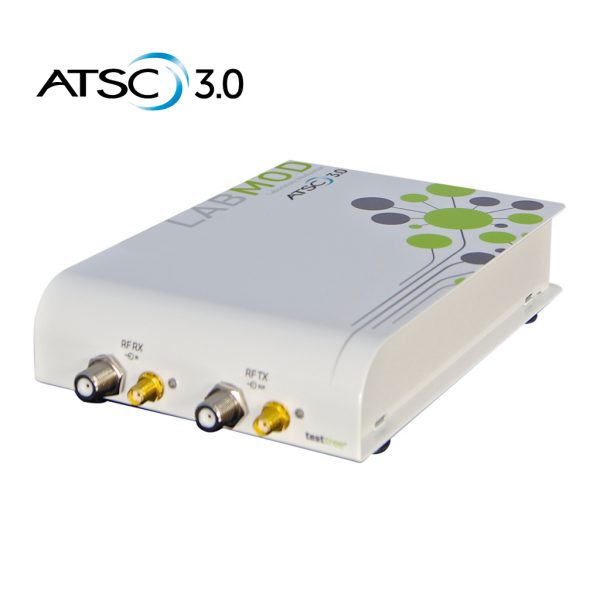
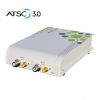
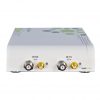
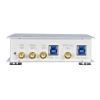
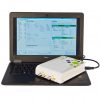


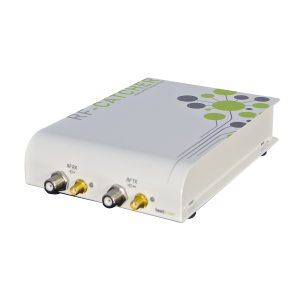
comments
There are no reviews yet.